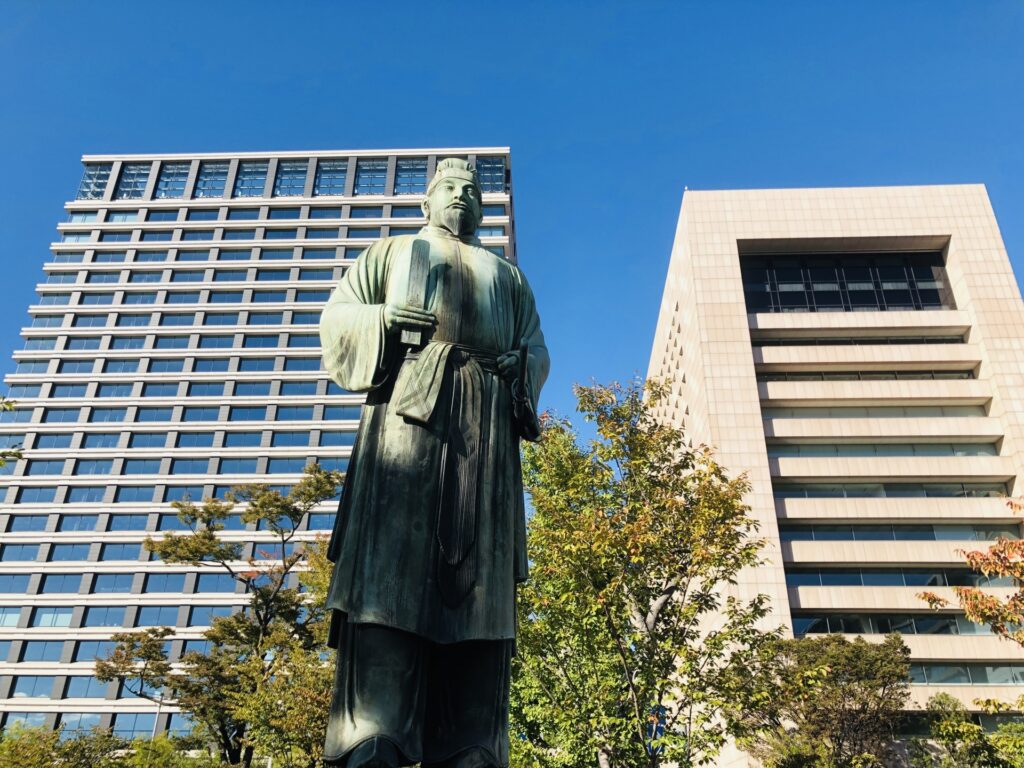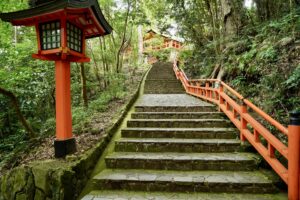Wake no Kiyomaro – Remembered as a Loyal Retainer and Enshrined as a Deity
第7回 和気清麻呂 ― 忠臣の記憶と神格化
Wake no Kiyomaro, the loyal retainer who safeguarded the imperial line, continues to inspire Japan with his unwavering spirit of fidelity. The statue standing before the Imperial Palace not only honors his achievements but also reminds us of the enduring meaning of loyalty and courage.

Statue of Wake no Kiyomaro in front of the Imperial Palace, with modern office buildings rising behind. The image symbolizes the connection between ancient loyalty and Japan’s present-day identity.
Introduction – From Statesman to Symbol
Wake no Kiyomaro’s life was marked by loyalty, sacrifice, and resilience. Yet his story did not end with his death in 799. Over the centuries, he came to be remembered not only as a statesman but also as a model of loyalty—a chūshin (忠臣), or “loyal retainer.” His memory was preserved in shrines, literature, and the collective consciousness of the Japanese people. Ultimately, he was elevated from a historical figure to a guardian spirit of the nation.
Honored as a Loyal Retainer
In the centuries after his death, Kiyomaro’s role in defending the imperial line against Dōkyō’s ambition was celebrated as an act of unmatched loyalty. Chronicles and tales retold his courage, framing him as the very embodiment of fidelity to the throne. In a society where loyalty became the highest virtue, his story provided a standard for both courtiers and warriors.
By the medieval period, samurai leaders looked back to Kiyomaro as a moral exemplar. Just as warriors were expected to endure hardship and even death for their lords, Kiyomaro’s exile and humiliation became a parable of true service. He was remembered as one who placed principle above personal safety, an ideal that resonated deeply with the emerging code of Bushidō.
Enshrined in Wake Shrine
Kiyomaro’s legacy was not confined to books. In his native land of Bizen (modern Okayama Prefecture), the Wake Shrine (Wake Jinja) was established to honor him and his sister Hiroimushi. There, he was venerated not only as a historical figure but also as a kami—a divine protector.
The shrine became a center of devotion, where people prayed for integrity, courage, and national protection. Pilgrims climbed the wooded paths and stone steps, not only to remember Kiyomaro’s deeds but to seek his guidance in their own lives. In this way, the man who once defended the imperial line in life continued to protect Japan in spirit.
Legacy of Divine Loyalty
The enshrinement of Kiyomaro reflects a broader Japanese pattern: the elevation of loyal and virtuous figures into guardians of the community. His story embodies the belief that fidelity to principle links human life with divine order. By honoring him as a god, the people affirmed that loyalty and integrity are not transient values but eternal guides for the nation.
Conclusion – The Loyal Spirit Endures
Wake no Kiyomaro’s journey—from exile and disgrace to vindication, and finally to enshrinement—illustrates how loyalty shapes not only history but also identity. Remembered as a chūshin and revered as a deity, he became both a moral standard and a spiritual protector.
Today, visitors to Wake Shrine still feel his presence. His story reminds us that true loyalty is not erased by hardship or death, but continues to guide and protect, echoing across generations as part of Japan’s enduring moral fabric.
[Reflection]
This seven-part series tracing the history of Wake no Kiyomaro has been more than the story of a single loyal retainer. It has also been a journey into how Japan safeguarded the imperial line and built its moral foundations.
From the oracle of Usa Hachiman, to the confrontation with Dōkyō’s ambition, through exile and restoration, the work of nation-building, the inheritance of Bushidō, and finally his recognition and deification as a loyal retainer—Kiyomaro’s life intersected with key turning points in Japanese history. His spirit was carried forward, generation after generation.
What I wished to convey through this series is that values such as loyalty and integrity transcend time. They guide people and serve as the strength that protects a nation. Kiyomaro was not a superhuman being. He was a man who bore heavy trials and yet chose to remain faithful to what was right. That he came to be remembered as a “loyal retainer” and enshrined as a deity reflects the deep human longing for such an ideal.
For us today, Kiyomaro’s spirit is not merely a tale of the past. Even in an age of uncertainty, it is the heart that treasures justice and loyalty which becomes the power to shape the future.
Series Overview
1. Prologue: Historical Context and the Emergence of Kiyomaro
2. Part 2: The Oracle of Usa Hachiman – Words that Defended the Imperial Line
3. Part 3: The Dōkyō Incident, Part I – Ambition and Confrontation
4. Part 4: The Dōkyō Incident, Part II – Exile and Restoration
5. Part 5: Wake no Kiyomaro and Nation-Building – From Yamashiro to Usa
6. Part 6: Kiyomaro’s Influence on Later Generations – The National Role of Usa Hachiman and the Inheritance of Bushidō
7. Part 7: Remembered as a Loyal Retainer and Deified – The Founding of Wake Shrine and Beyond
【Author’s Note】
What makes Wake no Kiyomaro truly great is not that he was powerful, but that he chose to uphold what was right. His life embodies the core of what the Japanese people have long cherished: chūgi (忠義, loyalty) and seijitsu (誠実, sincerity).
Here lies the essence of Japan’s unique concept of loyalty. Unlike in some neighboring traditions, where loyalty meant blind obedience to superiors, in Japan it carried a higher meaning. From ancient times, the people were regarded as the Ōmitakara—the “Great Treasures” of the Emperor, who stood as the nation’s highest moral authority. To serve only the interests of a ruler or a faction was seen as base. True chūgi was to act for justice itself—ultimately, for the well-being of the people.
Kiyomaro’s story reminds us that those who refuse to bend to power or desire—and who remain faithful to justice—are the ones who sustain nations and inspire people across generations. This is not only a lesson from the past but a call to the present: to value loyalty and integrity as guiding lights for the future.

